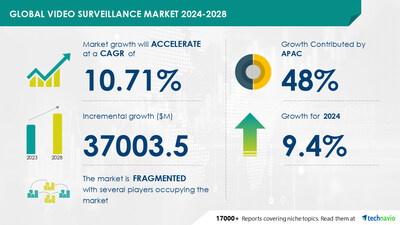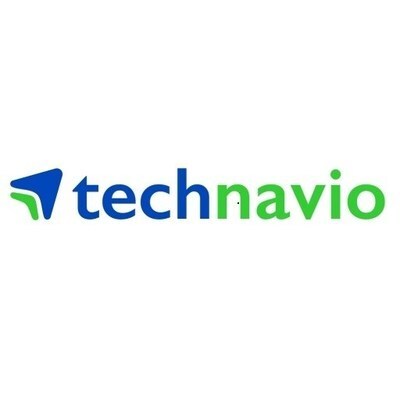AI Driving Video Surveillance Market Growth, USD 37 Billion Increase by 2028 to Combat Crime and Terrorism – Technavio Report

NEW YORK, Sept. 18, 2024 /PRNewswire/ — Report with the AI impact on market trends- The global video surveillance market size is estimated to grow by USD 37.00 billion from 2024-2028, according to Technavio. The market is estimated to grow at a CAGR of 10.71% during the forecast period. Need to mitigate criminal activities and terrorist attacks is driving market growth, with a trend towards advent of smart ai-based video surveillance. However, issues related to privacy poses a challenge. Key market players include Agent Video Intelligence Ltd., Canon Inc., Costar Technologies Inc., CP PLUS International, Dahua Technology Co. Ltd., Genetec Inc., Hangzhou Hikvision Digital Technology Co. Ltd., Hanwha Corp., Hexagon AB, Honeywell International Inc., Huawei Technologies Co. Ltd., i PRO Co. Ltd., Motorola Solutions Inc., NEC Corp., NICE Ltd., Robert Bosch GmbH, Teledyne Technologies Inc., Tiandy Technologies Co. Ltd., Zhejiang Uniview Technologies Co. Ltd., and Zicom Saas Pvt. Ltd..
AI-Powered Market Evolution Insights. Our comprehensive market report ready with the latest trends, growth opportunities, and strategic analysis- View your snapshot now
|
Forecast period |
2024-2028 |
|
Base Year |
2023 |
|
Historic Data |
2018 – 2022 |
|
Segment Covered |
Product (Hardware, Software, and Services), End-user (Public, Commercial, and Residential), and Geography (APAC, North America, Europe, Middle East and Africa, and South America) |
|
Region Covered |
APAC, North America, Europe, Middle East and Africa, and South America |
|
Key companies profiled |
Agent Video Intelligence Ltd., Canon Inc., Costar Technologies Inc., CP PLUS International, Dahua Technology Co. Ltd., Genetec Inc., Hangzhou Hikvision Digital Technology Co. Ltd., Hanwha Corp., Hexagon AB, Honeywell International Inc., Huawei Technologies Co. Ltd., i PRO Co. Ltd., Motorola Solutions Inc., NEC Corp., NICE Ltd., Robert Bosch GmbH, Teledyne Technologies Inc., Tiandy Technologies Co. Ltd., Zhejiang Uniview Technologies Co. Ltd., and Zicom Saas Pvt. Ltd. |
Key Market Trends Fueling Growth
The video surveillance market has been significantly transformed by the integration of Artificial Intelligence (AI). AI brings automation to video surveillance, enabling the analysis of large volumes of data to derive intelligent insights. Intel’s Movidius, for instance, uses AI and deep learning to make surveillance proactive by detecting unattended objects and monitoring behavior. AI-based video surveillance systems offer superior standards of facial, faceless, behavioral, and object detection, compensating for human errors. With the growing volume of surveillance data, manual analysis is becoming inefficient. Therefore, AI-based methodologies are expected to be integrated, improving crime spotting and prevention. Smart AI-based video surveillance systems offer features such as intrusion detection, motion and speed detection, object classification, behavioral analysis, GPS mapping, and vehicle tagging and tracking. Predictive crime monitoring is also expected to be enabled. Companies like IC Realtime, IntelliVision, and Kipod offer AI-based video surveillance solutions. China encourages the use of AI, leading to an increase in the adoption of AI-based facial recognition technology. SenseTime, a Chinese AI startup, offers AI-based facial recognition technology to local governments and private security firms. These technologies are extensively used in smart city projects.
The global video surveillance market is witnessing significant growth, particularly in sectors like buildings, departmental stores, food chains, malls, factories, and workshops. IP surveillance is a major trend, with IP security cameras becoming increasingly popular due to their wireless capabilities and integration with databases for business intelligence. The market is also seeing an uptick in the use of video surveillance in public spaces for safety reasons, including speed cameras and smart city initiatives. Major players like Panasonic Corporation and Infinova Corporation are investing heavily in this space, with advancements in technology leading to AI-powered video, real-time access, and remote monitoring. Regulatory requirements and security concerns are driving the need for professional expertise and higher investment costs. In addition, the use of hidden or spy cameras for anticorruption programs and fugitive tracking is also on the rise. In the Rest of Europe and Latin America region, per capita income and safety concerns are key factors influencing the adoption of video surveillance. Advancements in technology, including machine learning and computer vision, are helping to improve object recognition and real-time threat detection. However, potential threats from hacking and privacy concerns remain significant challenges for the industry.
Insights on how AI is driving innovation, efficiency, and market growth- Request Sample!
Market Challenges
- The video surveillance market’s expansion is subject to privacy concerns and the potential infringement of individuals’ fundamental rights. Public video surveillance systems may inadvertently capture private areas without consent, leading to privacy breaches. Extensive video surveillance raises questions about anonymity, as people’s democratic rights to express their views and seek medical assistance anonymously could be compromised. Additionally, the misuse of video surveillance for voyeurism poses a significant moral concern. Balancing legitimate monitoring with individual privacy is crucial to ensure the ethical growth of the video surveillance market.
- The Video Surveillance Market is experiencing significant growth due to increasing security concerns, smart city initiatives, and the need for business intelligence. Advanced technology, including AI-powered video, remote monitoring, and real-time access, is driving innovation. However, regulatory requirements, privacy regulations, data breaches, and potential threats pose challenges. Integration of video with access control, machine learning, computer vision, and advanced video analytics is leading to intelligent security solutions. Established manufacturers are offering IP cameras, network video recorders, Ethernet cables, monitors, routers, and modems to meet the demands of enterprises, data centers, banking facilities, hospitality centers, retail establishments, warehouses, communication networks, healthcare organizations, security applications, borders, transportation infrastructure, corporate houses, educational institutes, and more. The market is also witnessing the rise of mobile video surveillance and central control systems, as well as high-capacity storage and bandwidth requirements. Smart devices and internet usage are further expanding the market’s reach. However, potential threats, such as privacy regulations and data breaches, must be addressed to ensure secure and effective video surveillance.
Insights into how AI is reshaping industries and driving growth- Download a Sample Report
Segment Overview
This video surveillance market report extensively covers market segmentation by
- Product
- 1.1 Hardware
- 1.2 Software
- 1.3 Services
- 2.1 Public
- 2.2 Commercial
- 2.3 Residential
- 3.1 APAC
- 3.2 North America
- 3.3 Europe
- 3.4 Middle East and Africa
- 3.5 South America
1.1 Hardware- The video surveillance market consists of various hardware components including cameras, storage devices, network video recorders (NVR) hardware, video encoders, and network infrastructure. The primary component is the camera, with IP cameras being commonly used due to their network capabilities. IP cameras contain a lens, image sensor, memory, and processors, which enable image processing, compression, networking, and storage. Vendors like Axis Communications and Hangzhou Hikvision Digital Technology offer a range of IP cameras such as fixed box, fixed dome, modular, panoramic, explosion-proof, and thermal cameras. NVRs and digital video recorders (DVRs) are essential for managing and storing surveillance footage. NVRs are used with IP-based cameras, while DVRs are used with analog cameras. Vendors like Axis Communications, Hangzhou Hikvision Digital Technology, and Panasonic provide NVRs and DVRs, contributing to the market’s growth. The market is expected to expand as vendors introduce new hardware systems and innovative features during the forecast period.
Download complimentary Sample Report to gain insights into AI’s impact on market dynamics, emerging trends, and future opportunities- including forecast (2024-2028) and historic data (2018 – 2022)
Research Analysis
The Video Surveillance Market is experiencing significant growth due to escalating security concerns and smart city initiatives. Businesses and organizations across various sectors including healthcare, corporate houses, educational institutes, buildings, transportation infrastructure, borders, and departmental stores are increasingly adopting video surveillance systems for security applications. Advancements in technology have led to the development of AI-powered video surveillance, remote monitoring, and real-time access. Regulatory requirements and integration of video surveillance with access control systems are also driving market growth. Potential threats such as fugitives and anticorruption programs are further boosting demand. The market is witnessing the integration of machine learning, computer vision, and object recognition to enhance security and improve business intelligence. IP security cameras are replacing analog format systems, and wireless technology is making installation easier. Applications in factories, workshops, and food chains are also expanding the market’s reach.
Market Research Overview
The Video Surveillance Market is witnessing significant growth due to increasing security concerns and smart city initiatives. Advanced technology, such as AI-powered video and machine learning, is revolutionizing the industry with capabilities like object recognition, behavior analysis, and advanced video analytics. Real-time access and remote monitoring are essential features for businesses, enterprises, and organizations, including data centers, banking facilities, hospitality centers, retail establishments, warehouses, communication networks, healthcare organizations, and corporate houses. Regulatory requirements and privacy regulations add complexity to the market, while potential threats like data breaches and internet usage on smart devices necessitate security measures. The market includes various components like IP cameras, network video recorders, Ethernet cables, monitors, routers and modems, and is expanding to mobile video surveillance and central control systems. The market is global, with established manufacturers like Panasonic Corporation and Infinova Corporation, and emerging regions like the Rest of Europe, Latin America, and Abu Dhabi. The market faces investment costs and professional expertise challenges but offers opportunities for growth in various sectors, including transportation infrastructure, borders, educational institutes, buildings, and safety applications.
Table of Contents:
1 Executive Summary
2 Market Landscape
3 Market Sizing
4 Historic Market Size
5 Five Forces Analysis
6 Market Segmentation
- Product
- Hardware
- Software
- Services
- End-user
- Public
- Commercial
- Residential
- Geography
- APAC
- North America
- Europe
- Middle East And Africa
- South America
7 Customer Landscape
8 Geographic Landscape
9 Drivers, Challenges, and Trends
10 Company Landscape
11 Company Analysis
12 Appendix
About Technavio
Technavio is a leading global technology research and advisory company. Their research and analysis focuses on emerging market trends and provides actionable insights to help businesses identify market opportunities and develop effective strategies to optimize their market positions.
With over 500 specialized analysts, Technavio’s report library consists of more than 17,000 reports and counting, covering 800 technologies, spanning across 50 countries. Their client base consists of enterprises of all sizes, including more than 100 Fortune 500 companies. This growing client base relies on Technavio’s comprehensive coverage, extensive research, and actionable market insights to identify opportunities in existing and potential markets and assess their competitive positions within changing market scenarios.
Contacts
Technavio Research
Jesse Maida
Media & Marketing Executive
US: +1 844 364 1100
UK: +44 203 893 3200
Email: media@technavio.com
Website: www.technavio.com/
![]() View original content to download multimedia:https://www.prnewswire.com/news-releases/ai-driving-video-surveillance-market-growth-usd-37-billion-increase-by-2028-to-combat-crime-and-terrorism–technavio-report-302251467.html
View original content to download multimedia:https://www.prnewswire.com/news-releases/ai-driving-video-surveillance-market-growth-usd-37-billion-increase-by-2028-to-combat-crime-and-terrorism–technavio-report-302251467.html
SOURCE Technavio



